Shanghai Jazz Nights
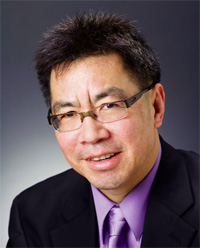
Composer-pianist Jon Jang ’78
Chinese-American pianist and composer Jon Jang ’78 has made a number of musical connections to the country of his ancestral heritage, including collaborations with traditional Chinese instrument virtuosos and Beijing Opera performers as well as performances with his sextet at the Beijing Jazz Festival. (Journalist Dan Ouellette wrote about the latter in an article for Salon that provided a rare glimpse into the Beijing jazz scene.) However, Jon wrote to me in an e-mail, “You beat me to Shanghai.”
China’s largest city is more than a vibrant center for jazz; it is something of a magnet for Obies who want to make their living here as jazz musicians.
I am one of them.
What exactly is it that attracts us to Shanghai to play? Or rather, what is it that keeps us here? For Michael Brownell ’06, the answers have to do with the liveliness of Chinese jazz audiences. “Shanghai’s jazz clubs are not a museum scene, but more like a night out. Some people listen to the music and some don’t ... but overall it’s friendlier in some ways. It feels warmer here than at clubs in the States.” On a web site Michael and some friends recently started about music in Shanghai, layabozi.com, he explains how jazz in Shanghai straddles the line between party music and listening music. “People drink, chat, listen, and, very occasionally, dance. The energy of the crowd isn’t that museum or concert-hall politeness that is the norm in the States.”
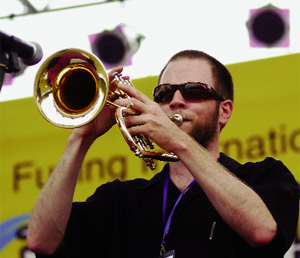
Trumpeter JQ Whitcomb ’02
For many Chinese, the attraction to jazz partly originates from Shanghai’s 1930s dance hall culture. Once ubiquitous in Shanghai’s sophisticated nightlife world, jazz continues to retain its association with the high life—even after a long hiatus due to the major upheaval China experienced in the middle of the 20th century. Since China’s reopening in the 1970s, jazz has made a steady comeback as it piques the curiosity of increasing numbers of Chinese who know about its legacy in Shanghai.
Andy Hunter ’02, who first arrived on the scene in 2000, trombone in hand, has subsequently facilitated performances for a number of Obies in Shanghai. “Jazz does especially well here because it is an art form that can be enjoyed in less formal settings than an orchestra hall,” says Andy. “It also carries the glamour of being foreign and being art, two qualities that the emerging middle class in places like Shanghai are increasingly curious about.” Of course, it helps that Shanghai is also home to a massive number of internationals, which means they often make up a sizable portion of the audiences.
The “Wild Wild West” of Jazz
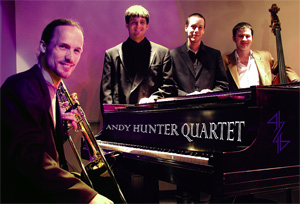
Trombonist Andy Hunter ’02 and his quartet, which includes pianist Kevin McHugh ’06 (second from right).
Andy credits his development and growth as a musician in China to his experience as a double-degree student at Oberlin —from his musical training in the Conservatory to the outstanding Chinese language training from the East Asian Studies (EAS) program to the Shansi grant he received in 2001 that allowed him to return to Shanghai to continue his involvement in the jazz scene. Although he is now based in New York City, he has managed to show up in Shanghai for several weeks at a time once or twice each year, ever since his first visit in 2000.
Trumpet player Theo Croker ’07 heard Andy speaking to a group of students about the opportunities for jazz musicians in Shanghai during Oberlin’s EAS-sponsored “China Rising” symposium in 2007. After getting the necessary contacts from Andy to line up a four-month gig at Shanghai’s House of Blues and Jazz, he came over with his group, which included drummer Charles Foldesh ’07 and bassist Rob Adkins ’04. Theo subsequently returned to Shanghai for a few months of freelancing. He credits the uniqueness of Shanghai’s jazz scene with attracting Obies to the city. “Shanghai is such an exciting city and the music scene is wide open. It’s like the “Wild Wild West” of jazz. This is probably what New York City was like in the 1920s and 1930s.”
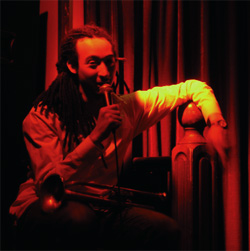
Trumpeter Theo Croker ’07
One cultural phenomenon in Asia that has become less familiar in the States since the 1920s is the “house band”— a single band that is hired to play the same venue six nights a week. These types of gigs abound in Shanghai now, at places like the House of Blues and Jazz or Shanghai’s five-star hotel jazz lounges. Setups like these, which typically also provide musicians with housing and sometimes even plane tickets, make it easy for international performers to check out the scene without having to build up freelance work. Eric Harper ’95 arrived in May 2008 to play in the house band at the Portman Ritz-Carlton for a six-month contract.
Making a Living
Even without a prepackaged gig, rent and other living expenses in Shanghai are cheap enough that adventuresome souls might find it easier to get enough work to pay the bills—and in shorter order than in most Western metropolises. As Charlie Foldesh explained in a recent video documentary, “I had to make a decision, either stay in Arizona and have a day job and play country and classic rock gigs until I got enough money to move somewhere where I could make a living as a musician, or come to Shanghai and start working as a musician full time.”
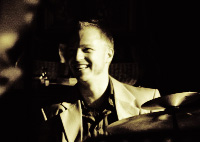
Drummer Charles Foldesh ’07
Charlie also appreciates the eclectic nature of Shanghai’s jazz musician community. “I really like that it’s so diverse here,” he says. “There are musicians from every corner of the planet, and they can all play!” Besides plenty of North Americans, musicians working in Shanghai include South Americans, Africans, Europeans, and, of course, Chinese and other Asians. And because the scene is relatively small, almost all of them end up hanging out and playing together at some point.
Although Theo was the first among his classmates to make the jump to Shanghai after hearing Andy’s talk, several more have since decided to come out for a look. Alto saxophonist Jonathan Parker ’08 spent two weeks in Shanghai during winter term of his senior year and liked it enough to come back in August for an as-yet-undecided length of time. Bassist Curtis Ostle ’06 has been hearing about Shanghai from Charlie and Michael for the last two years while he’s been completing his master’s degree at Eastman. He arrived in September to join the fray.
The relatively low cost of living can make Shanghai an attractive place to record an album, too; recording studio rental fees are a fraction of what they are in the States or Europe. Andy recorded his album The Slow Road to Shanghai in 2004 after his own quartet, which included pianist Kevin McHugh ’06, played for three months at the House of Blues and Jazz. Andy says, “Shanghai is a place where a musician can live affordably and quite comfortably with money earned only from performing. Also, since this generation of the Shanghai jazz scene is relatively new, it’s a place where, in the spirit of Oberlin’s old slogan, ‘one person can make a difference.’”
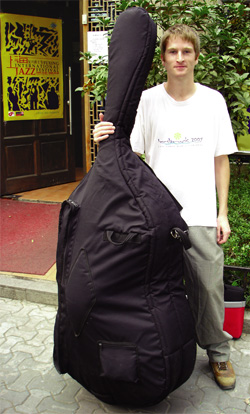
Bassist Michael Brownell ’06
Teaching, the quintessential method for making a difference, is nearly always a component of a professional musician’s career, and students hoping to improve their skills occasionally approach the jazz musicians in Shanghai. In the past, teaching work like this had been infrequent and inconsistent for most, a small bonus to supplement one’s income but rarely reliable for any length of time. Although some international schools in Shanghai have hired musicians to teach instrument lessons weekly for longer periods, there was never a centralized music school focused on tapping into the growing resource of superb jazz musicians now living in Shanghai. That changed in 2006, when the JZ School opened.
The first jazz school in China, the JZ School is partnered with the JZ Club, a popular jazz club in Shanghai where the widest range of international musicians play on a regular basis. The school’s goal is to provide the most critical component needed for a jazz scene to truly thrive in the long term: education. The JZ School also offers many musicians living in Shanghai the opportunity to find more consistent teaching work.
I teach at the school, and so does Eddy Goltz ’79, who showed up in Shanghai in 2006 after living in Portugal for 20 years. Discouraged by Europe’s declining jazz market, he had heard about Shanghai’s growing jazz scene from a friend living here and decided to take a look. He’s also performing in various venues.
He loves it in Shanghai.
Trumpeter JQ Whitcomb ’02, originally from Santa Fe, New Mexico, has been making his living playing and teaching jazz in Shanghai since 2003. A cofounder of the JZ School, he writes a blog about Shanghai’s jazz scene (www.shanghaijazzscene.com/ blog) and is music director of the jazz radio program Soulfire (www.soulfire.cn).
